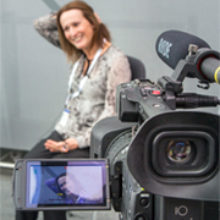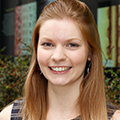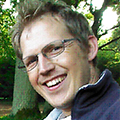Interacting with the Media
20 Sep - Charles Darwin House 2, London, UK
If you’re a microbiologist interested in learning about how to work with the press, this event is for you.

Overview
Communicating your research successfully to the media requires good understanding of how the media operates and what journalists expect from researchers. The Microbiology Society is holding a training session that will equip you with the basics of how to effectively interact with the media and to raise awareness of your research.
This event will take place from 11:00–16:00, 20 September 2016, at Charles Darwin House 2, 107 Gray's Inn Road, London WC1X 8TZ.
Approved by the Royal Society of Biology for purposes of CPD, this event may be counted as 15 CPD credits.
Registration
This event has been postponed. For any inquiries please contact [email protected]
Registration rates*
|
£30 |
Full Concessionary Member, Postgraduate and Undergraduate Student Members |
|
£50 |
Full Members |
|
£110 |
Non-members |
*A sandwich buffet lunch is included in the price.
If you have any queries, please contact [email protected]
Not a Society member? Find out how to join the Society.
What to expect & speakers
In this meeting leading microbiologists and media relations specialists will share their experience on how to work with journalists and press officers and to turn them into powerful allies to disseminate your research and increase its impact. You will learn how to deal with media attention, what press officers and journalists expect from scientists and develop your practical media skills so that by the end of the day, you feel more confident to deal with media enquiries if called upon. The five-hour in-depth training will provide plenty of opportunities for learning from experts and engaging exercises in a friendly and supportive environment.
Speakers
- Meera Senthilingam (Health and Development Writer, Producer and Consultant)
- Sam Wong (Science Journalist, New Scientist)
- Alice Kay (Press Officer, Science Media Centre)
- Professor Wendy Barclay (Chair in Influenza Virology, Imperial College London)
- Dr Edward Wright (Senior Lecturer, University of Westminster)
- Dr Adam Roberts (Senior Lecturer, University College London)
- Dr Benjamin Thompson (Head of Communications, Microbiology Society)
 Meera Senthilingam
Meera Senthilingam
Meera is currently a digital producer within the health team at CNN/CNN International. She is passionate about reporting on global health issues and often ventures into the field to report on-the-ground about issues affecting communities around the world. She has previously reported for a range of international media organisations including: BBC World Service; BBC Radio 5 Live, New York Times and New Scientist. Meera has over nine years' experience in science and health journalism and holds a Masters in Science Communication from Imperial College London, as well as a Masters in the Control of Infectious Diseases from the London School of Hygiene and Tropical Medicine. Her last graduate degree enabled her to also become a published public health researcher.
As well as reporting, Meera is keen to build capacity for high quality health journalism in other parts of the world and believes in good communication of public health as a whole. To enable this, in the past she has worked with various organisations including the Wellcome Trust, BBC Media Action, the National Press Foundation and the University of Cape Town.
 Sam Wong
Sam Wong
Sam is a reporter for New Scientist. He writes mainly about biology and medicine, and produces video content for the magazine's social media channels. His work has also been published in the Guardian, Nature, Mosaic, Wired and the Atlantic. Before becoming a journalist, Sam worked as a press officer at Imperial College London and the British Heart Foundation. He has a MSc in Science Communication from Imperial and a BA in Natural Sciences from Cambridge.
 Alice Kay
Alice Kay
Alice is a press officer at the Science Media Centre, an independent press office that works to ensure the news coverage of tricky, messy, and controversial science is as accurate as possible by helping scientists to engage more effectively with the media. The SMC is first and foremost a press office for science – it provides journalist with what they need when science is in the news, whether this be accurate information, a scientist to interview or a feature article. Alice has been with the SMC since 2013 and works on stories across science and health, including: infectious diseases such as Ebola; diet and nutrition; e-cigarettes; and cancer. She graduated from University College London in 2012 with a degree in Psychology, and has volunteered and worked with various other science communication organisations including the Cambridge Science Centre.
 Professor Wendy Barclay
Professor Wendy Barclay
After graduating from the University of Cambridge, Wendy's postgraduate study at the Common Cold Unit in Salisbury involved infecting human volunteers with cold viruses to understand why people keep getting colds year after year. In her two postdoctoral appointments, at the University of Reading and then Mount Sinai Medical Centre in New York, Wendy learned the molecular virology skills that would form the technological basis of her research career. Upon returning to Reading in 1995 to a junior lectureship, she set up her research group to study influenza viruses. In May 2007, she took up a Chair in Influenza Virology at Imperial College London. She is particularly interested in the mechanism by which viruses can cross from animal sources into humans to cause new pandemics.
Wendy sits on several advisory boards, for example offering advice about respiratory virus outbreaks, and als ofor the Science Media Centre, whose aim is to improve the relationship between scientists and the media.
 Dr Edward Wright
Dr Edward Wright
After completing his BSc degree in Virology at the Unviersity of Edinburgh, Edward successfully studied for a PhD in Molecular Virology from the University of Cambridge. Following this, he was able to undertake research in Uganda for 18 months at the Medical Research Centre/Uganda Virus Research Institute (MRC/UVRI) Research Unit on AIDS. Prior to his appointment at the University of Westminster, he was a postdoctoral Research Fellow at University College London. During these posts, he undertook studies into highly pathogenic, (re-)emerging viruses and pandemic preparedness. As a result of this, Edward has written blogs for The Huffington Post, commentaries for The Conversation, helped with briefings for learned societies, and provided input into a response for a House of Commons Science and Technology Committee enquiry. He has undertaken over 80 interviews with national and international television, radio and written media outlets.
 Dr Adam Roberts
Dr Adam Roberts
Adam has been working in the field of antibiotic resistance for almost 20 years at University College London and has published prolifically on the topic. His recent work has seen his citizen science, crowdfunded project bring the need for new antibiotics into more general discussions and is being followed by many members of the public and the media. He is an advisor to the Longitude Prize and was the 2015 Microbiology Outreach Award recipient from the Microbiology Society.
Agenda
Some of the key items that will be covered include:
- Why should scientists engage with the media?
- How to attract media interest to your research
- How to work with journalists and press officers
- How to present your research and raise its profile
- How to catalogue your experience
Who should attend
This training event is open to all but is aimed at those leading, or planning to lead, a research group. Researchers at any stage of their career, including those with little or no experience of collaborating with the media, will benefit from attending.
Venue
This event will take place 11:00–16:00, 20 September 2016, at Charles Darwin House 2.
Charles Darwin House 2
107 Gray's Inn Road
London
WC1X 8TZ
Directions
By rail
The nearest rail stations are:
- Farringdon (0.7 miles)
- Kings Cross (0.8 miles)
- Euston (1.3 miles)
By tube
The nearest underground stations are:
- Chancery Lane (0.4 miles, Central line)
- Russell Square (0.5 miles, Piccadilly line)
- Holborn (0.7 miles, Central and Piccadilly line)
- Farringdon (0.7 miles, Circle, Metropolitan and Hammersmith & City line)
- Kings Cross (0.7 miles, Northern, Victoria, Piccadilly, Circle, Metropolitan and Hammersmith & City line)
- Euston (1.1 miles, Northern and Victoria line)
By bus
The following bus routes serve Theobalds Road:
- 19 (Finsbury Park Interchange – Battersea Bridge/Hester Road)
- 38 (Clapton Pond – Victoria bus station)
- 55 (Lea Bridge Road/Bakers Arms – Oxford Circus)
- 243 (Redvers Road – Waterloo Station/Mepham Street)
The following bus routes serve Grays Inn Road:
- 17 (Archway Station/Junction Road – London Bridge Station)
- 45 (St Pancras International Station – Atkins Road/New Park Road)
- 46 (Lancaster Gate Station – Stonecutter Street)
By car
You are advised to use public transport where possible, as there is a limited amount of on-street metered parking space available on Roger Street and North Mews. The nearest car park facilities are London Saffron Hill, EC1N 8XA and 12 Farringdon Road, EC1M 3JB.
